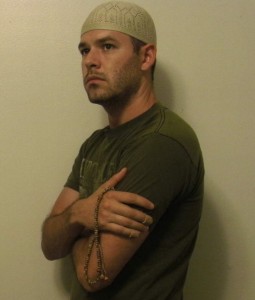I shaved my head for Buddhism, no one complained. I painted my face with the tripundra for Hinduism and got strange looks at Wal-mart, they only chuckled. I created a fire hazard in the house with all my candles as a Zarathushti and only caused a minor annoyance. I did, well, virtually nothing during Shabbat as a Jew and caused little fuss.
But the moment I grow a beard for Islam…”Hell hath no wrath than a woman scorned.”
I’m pretty sure I could start sacrificing the neighborhood pets and it would not cause half the drama in this house that growing a beard does. Earlier in the week, I asked the Facebook “Congregation” if growing a beard was considered a required/pious act in Islam. And overwhelming number of respondents said “yes.”
My wife was the first to comment on that status. She voted “no.”
This isn’t a simple “no,” it’s a line in the proverbial sand. No one in this house likes facial hair–including myself–but if it’s in the name of Project Conversion, well, I’ game.

So here I am with my week-old beard, doing the right thing by Islam–what the Prophet Muhammad himself (pbuh) said to do. Right? Well, that depends on whom you ask.
Let’s ask the Qur’an, the book that, according to itself and 1.2 billion faithful Muslims, is direct instruction from Allah.
Oh wait, there’s nothing in the Qur’an about beards. No commandments, no recommendations…I can’t find anything. In fact, Allah says this about the Qur’an in sura 5 verse 3:
“Today I have perfected your system(religion) for you, and completed My blessings upon you, and I have approved submission as the system for you.” Qur’an 5:3
And for good measure:
“If anyone desires a religion other than Islam (submission to Allah), never will it be accepted of him…” Qur’an 3: 85
Seems pretty clear to me that if Allah intended men to wear beards as a religious implement, He would have said so…but He didn’t. Turns out, whenever the argument is made for beards, Islamic scholars and jurists always turn to the Hadiths.
Hadith, or sayings/actions of Muhammad (pbuh), are considered holy writ second (and some consider equal to) the Qur’an itself. They are compilations of The Prophet’s supposed actions recorded and codified in the 8th and 9th centuries…so within about 200 years after his death. In this context, Hadith are supplementary material meant to clarify what might not be clear to us (or left out) in the Qur’an.
Oh wait a minute…didn’t Allah say that He “…completed our system(religion)”? If He completed our religion with the Qur’an and didn’t include instructions about a beard, then why are we instructed by Hadith to do so? Well, maybe we just missed something. We are human, after all, and the Qur’an was written so long ago that it’s tough to–
“And We (Allah) made the Qur’an easy to understand…” Qur’an 54: 17
Dang it!
At this point, I’m feeling sorry for the beard enthusiasts. Clearly Allah isn’t big on beards, otherwise wouldn’t He say something about it in the Qur’an? Enter loophole:
“Indeed, in the messenger of God a good example has been set for you for he who seeks God and the Last Day and thinks constantly about God.” Qur’an 33: 21
Okay yeah but–
“O you who believe, obey God and His messenger, and do not turn away from him while you have heard.” Qur’an 8: 20
Remember what we said Hadith were? The reported actions and sayings of the Prophet. These two verses from the Qur’an–From Allah–just called Muhammad (pbuh) our exemplar and to follow what he tells us. The Islamic jurists and scholars now have a fair shot at this. Maybe Allah did not specify everything in the Qur’an because by instructing us to follow Muhammad, He was doing so indirectly. Hmmm…
It really comes down to these two questions, one’s that haunt Muslims to this day: 1) Is the Qur’an, a book Allah Himself called “complete”, enough? And 2) Can we trust the authenticity of the Hadiths?
Critiques of Hadith argue that this collection of so-called “actions of the Prophet” are nothing more than a tool to control less-knowledgeable Muslims. There are many cases, they claim, in which the Hadiths contradict the Qur’an itself!
Decisions, decisions…
This isn’t the first time in a religion’s history that we see “add-on’s” to Scripture. Some may argue that Paul’s letters to the Church are not equal to the Gospel of Jesus, even though they are regarded as such and sometime contradict JC’s teachings. Many sutras are attributed to the Buddha hundreds of years after his death and the summation of the Dhammapada. Jewish scholars are known for their vast commentary, and the Latter-day Saints claim their own sequal to the New Testement called The Book of Mormon.
The question is, with our respective religions, when is “God’s word” enough without the additions? Is it possible to reduce inspired writ to its common, simplified denominator? The trouble is that humans like complicated systems and rules. Complex rituals and rites seem to make our spiritual efforts more sublime and mysterious, even meaningful.
Franz Kafka once said that, “Every revolution evaporates and leaves behind the slime of a new bureaucracy.”
Every new religion is a revolution against the old, or at least–as many claim–a revision. But are we practicing the spirit of that simplistic renewal or are we mired in a new spiritual bureaucracy developed by our own hands? That one’s up to you.
As for me and the beard, I’m making a compromise. Because it is an unquestionable religious law for a Sikh (next month’s religion) to grow a beard, and because my wife says she’s not kissing me until I shave, I will keep my beard for Islam for half of this month (come on, 60 days without some action is tough).
May Allah have mercy on me if I am in error, because after all, He is Oft-Forgiving, All-Knowing, and hopefully a clean-shaven enthusiast.
